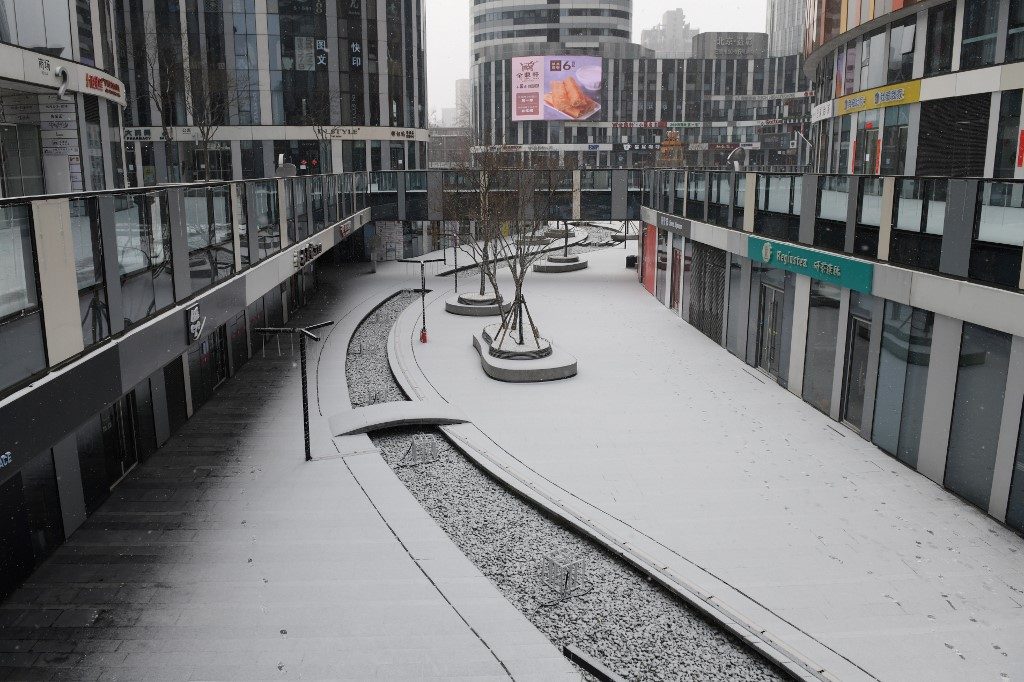SUMMARY
This is AI generated summarization, which may have errors. For context, always refer to the full article.

BEIJING, China – China’s struggle to contain the deadly coronavirus is deepening concerns about the impact on the world’s No. 2 economy, as factories stay closed and millions of consumers remain holed up at home.
The epidemic, which has killed hundreds and infected more than 24,000, has led to sweeping travel restrictions across the country as well as the closure of popular tourist attractions, businesses, schools, and entertainment venues.
Central Hubei province – at the epicenter of the outbreak – has effectively been locked down since late January with other cities imposing restrictions this week in the eastern industrial belt, including the home of tech giant Alibaba.
Now, economists are warning of a bruising 1st quarter for the already stuttering economy – and potentially a severe hit to full-year growth – after a ruined Lunar New Year holiday, with some saying it could prove more painful than SARS.
“The inopportune timing of the outbreak around Chinese New Year, a time of increased transport and economic connectivity…as well as the lockdown of affected regions all add to the equation,” said Louis Kuijs of Oxford Economics.
The crisis also comes as Beijing battles to kickstart growth after a drawn-out slowdown caused by weak overseas demand and the United States trade war, and there are building concerns a hit to China could have a domino effect globally.
Moody’s analysts said the virus was “a serious mounting threat to the fragile Chinese and global economies,” adding that there are “no good scenarios.” (READ: World Bank to lower global growth forecast over virus outbreak)
Quiet factories
Many factories closed for the Lunar New Year break have delayed reopening – exceeding a 3-day extension of the holiday that authorities imposed to prevent large public gatherings.
Manufacturing accounts for around a third of China’s economy and the auto industry is set to take a sharp blow, given that Hubei’s quarantined capital, Wuhan, is among China’s largest production bases.
A Ford spokesman told Agence France-Presse (AFP) production would resume around next week, but said the epidemic has already “suppressed or delayed consumer purchases to a large degree.”
Dongfeng Motor Corporation, which is based in Wuhan and is one of China’s biggest auto groups, said its reopening “will depend on the prevention and control of the epidemic.” (READ: China virus injects fears for global supply chains)
Ratings agency S&P has predicted the delay in opening factories could hit car production by up to 2% and warned the real impact may be larger as workers could potentially shun Hubei when called back to work.
Oxford Economics believes the virus could knock at least two percentage points off China’s growth in the 1st quarter before seeing an improvement in April-June.
Still, it cut its full-year outlook to 5.4% expansion – markedly down from its previous estimate of 6%, which was in line with 2019 and the slowest in 3 decades.
However, the biggest hit to the economy is likely to be from China’s army of consumers saying at home, observers said, with Moody’s analysts expecting spending on transportation, retail, tourism, and entertainment to be hammered.
The 2019 Lunar New Year holiday saw retail and catering enterprises report combined sales of around $150 billion, according to state news agency Xinhua.
Domestic travel revenues clocked in at more than $73 billion, it said, as people traveled across the country to visit family, while the Forbidden City hosted nearly half a million visitors.
But this year, shopping malls, eateries, cinemas, and transport hubs were quiet, while the Forbidden City was closed.
State support
Big-name high-street titans are also feeling the strain. Nike and clothing giant H&M have both closed half their stores in China, with the Swedish firm telling AFP a “short-term impact on sales is inevitable.”
Jewelry chain Pandora said there had been “an unprecedented decline in consumer traffic in China and Hong Kong.”
Apple and Starbucks have also shut down outlets.
Passenger volumes on air, rail, road, and water transport plunged more than 70% from a year ago.
Analysts at Allianz and Euler Hermes warned the economic impact could surpass the SARS epidemic because private consumption is now a much more important driver of economic growth than in 2003.
While authorities have stepped up to provide support – the central bank has pumped more than $200 billion into financial markets this week – Moody’s analysts said the full benefits are “unclear” for now.
“Given the high levels of uncertainty, consumers may simply save the spending they had planned for the Lunar New Year holiday, and could spend more cautiously in general,” they said.
ING economist Iris Pang added that with the central bank having done its part to avoid “market chaos” – Shanghai equities have clawed back some of the near-8% rout last Monday, February 3 – government fiscal stimulus is next on the cards.
Beijing has already been spending on rapidly building hospitals in Wuhan, and eased import duties and consumption tax on medical equipment.
But experts warn of a larger spillover effect on supply chains, with DBRS Morningstar noting China makes up 17% of global gross domestic product, while a growing list of nations banning flights to and from the country will have a huge impact on their tourist sectors. – Rappler.com
Add a comment
How does this make you feel?
There are no comments yet. Add your comment to start the conversation.